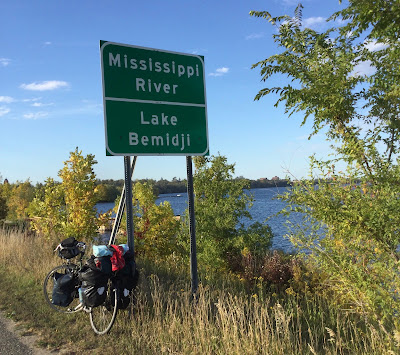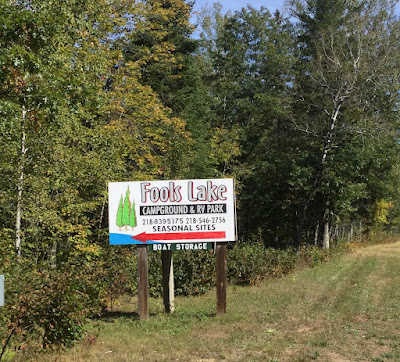I’ve intersected with the Mississippi more times on this trip than I did with Highwwy 66 in Oklahoma last February. The latest was in Bemidji, which lays claim to its lake being the last lake the River passes through before it becomes an entity all its own. I’m close enough now to its headwaters that tourist shops in Bemidji sell Mississippi Headwaters souvenirs.
In the northern woodlands the towns are smaller and fewer. Many have one hundred or less residents. They are dependent on a once a week bookmobile for their library. Since I’m dependent on them for the internet, I’ve gone as many as seventy miles without being able to connect. In a town of nine hundred I asked an older guy if there was a library there. He said the town was toomsmallmtomhave a library, but it didnt matter as no one there could read. The camping couldn’t be easier. I can watch the sun ease below the horizon and have no panic of finding a place to camp. There is always a spot moments after it makes its exit.
I was a little leery two nights ago when I saw three young men in camouflage sauntering along the road cradling rifles at dusk. Their bright orange beanies identified them as hunters. I pedaled three miles past them before I ventured into the forest past a gate down a weed-choked dirt road. It took me into an overgrown meadow with a dilapidated elevated hunter’s blind in a corner that didn’t look as if it had been used in years. I felt safe camping somewhat in the open with my bike besides my tent, assured that no hunter would mistake me for a Bambi. It was a quiet night without even a deer venturing nearby.
I had camped thirty miles south of Park Falls and its Carnegie. It was the first of these travels that was vacant. It had been maintained well enough to attract a tenant. It was located just a block from the town’s main intersection and its MacDonalds.
I arrived in time for its breakfast bargain of two sausage biscuits for three dollars, a better bargain and more calories than two McChickens, which I would have had if I’d been a bit later. Six old guys sat at one table nursing coffees. Other elderly in pairs and alone were scattered about as if this were the local Senior Center. One guy from the table of six came over and asked if I was traveling. He didn’t realize the town library had been funded by Carnegie nor that he had provided over sixty of them in the state. He assured me I didn’t have to worry about snow until mid-November.
Only once has a motorist slowed to angrily shout at me, “They built that path over there for you.” The shoulders though can sometimes have similar uneven pavement with a break slashing across it every ten or fifteen feet. They force me onto the road to spare not only my back but my spokes the abuse. Fortunately there’s not much traffic. I just have to monitor my mirror more than usual for traffic coming from behind.
I received the news from a baseball podcast that as of October 1 Canada is no longer going to require Americans to be vaccinated to enter the country which is good news for those teams with players who are vaccinated that could be going to play the Toronto Blue Jays in the playoffs. It’s also good news for me, sparing me the rigmarole of registering on line to enter the country and specifying where and when I expect to arrive. It could be in four or five days.
Learning that was as exciting as hearing Carnegie as the answer to a question on Matt Stephen’s cycling podcast. He always has a quiz for his guest relating to his home town. His guest was the English broadcaster Rob Hatch and the question was, “What American philanthropist funded the library in Atherton,” Hatch’s home town. It was a multi-choice question and Hatch answered it correctly.










No comments:
Post a Comment